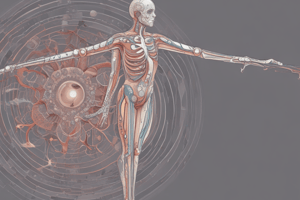Podcast
Questions and Answers
Which buffer system has the largest buffering capacity in the extracellular fluid?
Which buffer system has the largest buffering capacity in the extracellular fluid?
- Protein buffer
- Phosphate buffer
- Haemoglobin buffer
- Bicarbonate buffer (correct)
Which organ is responsible for CO2 elimination in the body?
Which organ is responsible for CO2 elimination in the body?
- Lungs (correct)
- Liver
- Kidneys
- Heart
In alkalosis, what happens to alveolar ventilation and PCO2 levels?
In alkalosis, what happens to alveolar ventilation and PCO2 levels?
- Alveolar ventilation decreases, PCO2 decreases
- Alveolar ventilation increases, PCO2 increases (correct)
- Alveolar ventilation increases, PCO2 decreases
- Alveolar ventilation decreases, PCO2 increases
Which buffer system takes part in hydrogen ions excretion in renal tubules?
Which buffer system takes part in hydrogen ions excretion in renal tubules?
What is the main intracellular buffer of the blood?
What is the main intracellular buffer of the blood?
Flashcards are hidden until you start studying
Study Notes
Buffer Systems and pH Regulation
-
Bicarbonate buffer system has the largest buffering capacity in the extracellular fluid.
-
Lungs are responsible for CO2 elimination in the body.
Alveolar Ventilation and PCO2
- In alkalosis, alveolar ventilation decreases to reduce CO2 elimination and increase PCO2 levels.
Renal Buffering
- Phosphate buffer system participates in hydrogen ions excretion in renal tubules.
Intracellular Buffer
- Proteins act as the main intracellular buffer in the blood.
Studying That Suits You
Use AI to generate personalized quizzes and flashcards to suit your learning preferences.




